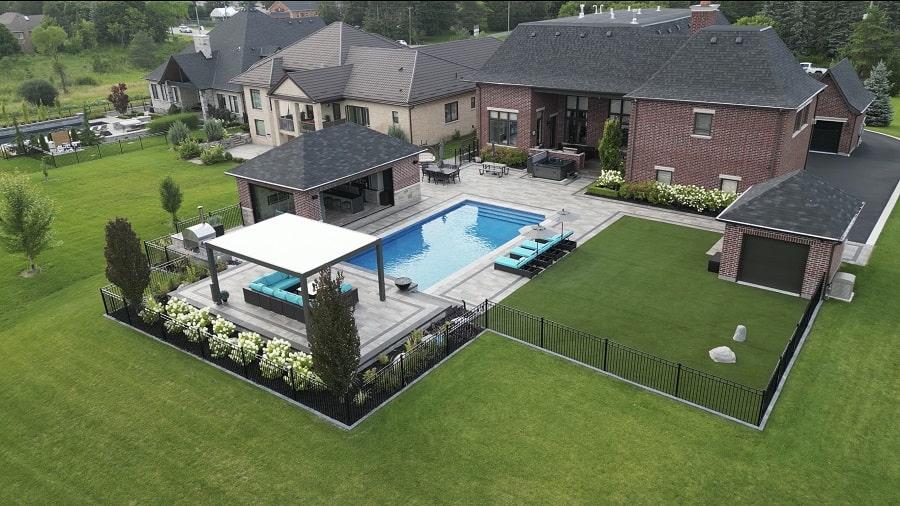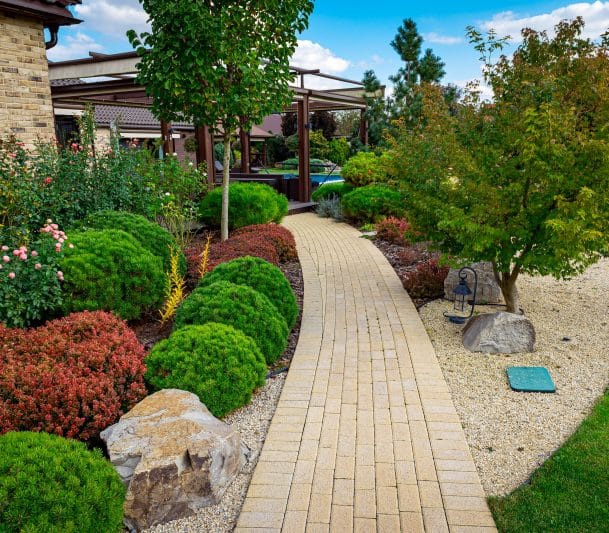High-quality landscaping services to fit your budget and style
Comprehending the Comprehensive Scope of Works in Professional Landscaping Services
The substantial scope of professional landscape design services incorporates a selection of basic aspects. It includes landscape design concepts, plant selection, and hardscaping features. In addition, it resolves irrigation systems and maintenance approaches. Each aspect plays an essential function in producing useful and visually pleasing exterior rooms. Recognizing exactly how these elements function with each other can expose much about the art and science of landscaping. The trip into this elaborate area is just starting.
Landscape Style Principles
Effective landscape layout concepts are essential for creating harmonious outdoor spaces that enhance both aesthetic allure and performance. These concepts direct the setup of aspects within the landscape, guaranteeing a natural visual experience. Trick elements include equilibrium, which disperses aesthetic weight evenly; percentage, which associates the size of numerous components per other and the area; and unity, which develops a feeling of integrity with regular styles and materials.
Additionally, focus routes attention to centerpieces, while rhythm establishes motion with repetition of style attributes. The efficient usage of line can develop paths and direct the eye through the landscape. Additionally, recognizing the website's topography, environment, and existing attributes is crucial for integration with the surrounding atmosphere. By sticking to these foundational concepts, landscape designers can craft areas that not just look appealing but additionally offer their desired objective, improving the general experience for users.
Plant Selection and Installation
In the domain of professional landscaping, plant selection and setup play a vital duty in accomplishing a flourishing yard - landscaping services. Emphasizing native plant advantages, seasonal factors to consider, and the particular soil and sunlight demands of each species guarantees a lasting and visually pleasing landscape. Cautious planning in these locations not only enhances biodiversity but likewise advertises lasting ecological health and wellness
Native Plant Advantages
Why should homeowners think about native plants for their landscaping projects? Native plants use numerous advantages that enhance both visual appeals and environmental sustainability. They are well-adapted to regional climates, requiring much less water and maintenance contrasted to non-native species. This resilience lowers the need for chemical fertilizers and pesticides, advertising a healthier ecological community. In addition, native plants offer environment and food for local wildlife, consisting of pollinators, which can boost biodiversity in houses. Their familiarity with local dirt and weather likewise causes much better growth rates and durability. By selecting native plants, house owners not only develop visually appealing landscapes yet additionally add to eco-friendly conservation, making a positive effect on their neighborhood setting. Indigenous plants represent a smart selection for landscape design jobs.
Seasonal Plant Considerations
Home owners that have actually welcomed native plants in their landscaping can further boost their outdoor spaces by considering seasonal plant selections. By integrating plants that grow in details periods, they can develop aesthetically attractive and dynamic landscapes throughout the year. Springtime may usher in vivid blossoms like tulips and daffodils, while summer can display rich foliage and vibrant perennials. Fall presents a palette of cozy tones with goldenrods and asters, while winter season can be emphasized with evergreens and decorative yards for structure. Professional landscaping companies typically recommend selecting plants that not just enhance existing native species yet additionally give year-round passion and assistance neighborhood wild animals. This thoughtful technique to seasonal plant choice ensures a consistently advancing and lasting garden atmosphere.
Soil and Sunshine Demands
Effective landscape design rests on recognizing the specific dirt and sunlight needs of plants. Different species thrive under varying problems, calling for a mindful assessment of both factors during the selection procedure (landscaping). Dirt types, such as sandy, clay, or loamy, influence drain, nutrient availability, and root advancement. Furthermore, pH degrees can influence plant wellness, necessitating soil screening to identify viability. Sunlight needs differ considerably; some plants flourish in complete sun, while others prefer partial or complete color. An expert landscaper considers these elements to assure peak development and aesthetic appeal. By aligning plant selections with the environment's details characteristics, landscapes can attain sustainability, strength, and aesthetic harmony, ultimately resulting in successful plant facility and lasting maintenance
Hardscaping Features and Construction
While landscaping frequently stimulates pictures of lush plant and vibrant flowers, hardscaping attributes play an important function in specifying outdoor areas. These components, which include outdoor patios, sidewalks, keeping wall surfaces, and attractive stonework, provide structure and capability to lawns and yards. Hardscaping uses materials such as concrete, block, rock, and wood, permitting varied layouts that complement the natural landscape.
The construction of hardscaping functions calls for cautious preparation and execution to ensure durability and visual allure. Professionals evaluate site problems, water drainage, and spatial relationships to produce natural outdoor settings. Appropriate installment methods are important, as they avoid issues like disintegration and shifting with time.
Incorporating hardscaping not just boosts the aesthetic interest of a residential or commercial property yet also helps with exterior tasks, making it a basic facet of comprehensive landscaping services. Eventually, thoughtful hardscaping adds to both the functionality and appeal of exterior spaces.
Irrigation Systems and Water Management
Efficient watering systems and water administration are important elements of expert landscaping, as they assure that plants obtain the essential hydration for ideal development. These systems can vary from straightforward drip irrigation configurations to sophisticated automatic sprinkler systems, designed to fulfill the specific needs of diverse landscapes. Proper water administration not only maximizes water use, minimizing waste, but likewise improves plant health and wellness and reduces illness risks.
Landscaping professionals examine different factors, consisting of soil type, plant types, and neighborhood climate, to develop tailored watering remedies. Furthermore, incorporating rainwater harvesting techniques can even more boost sustainability and efficiency (Read More). Normal maintenance of irrigation systems is vital to preserve performance and avoid leaks, which can bring about water loss and enhanced costs. Ultimately, a well-designed irrigation system plays a crucial role in preserving the visual allure of exterior spaces while promoting environmental stewardship within expert landscaping methods
Yard Care and Maintenance Techniques
Lawn care and upkeep approaches are basic for attaining a lavish, healthy and balanced lawn that enhances the overall landscape. These strategies encompass numerous techniques targeted at promoting optimal growth and aesthetic allure. Normal mowing is necessary, as view website it urges thick, even development while stopping weeds from establishing. Furthermore, proper fertilization gives needed nutrients, with applications tailored to the specific yard kind and soil conditions.
Watering practices must concentrate on deep, seldom watering to urge origin advancement, while aeration boosts soil framework and advertises nutrient absorption. Parasite and illness management is additionally vital; determining concerns early enables for effective therapies that lessen damage.
Overseeding can renew slim or damaged yards, enhancing thickness and color. By carrying out these targeted grass care methods, landscaping experts can assure that yards continue to be healthy and balanced and dynamic throughout the periods, significantly adding to the overall appeal of the home
Seasonal Landscape Treatment and Upkeep
As the seasons adjustment, correct landscape care ends up being essential for maintaining the health and wellness and elegance of outside areas. Each period offers unique difficulties and needs. In springtime, landscape professionals focus on trimming, growing, and feeding to urge growth. Summer demands routine watering, weed control, and parasite monitoring to safeguard recently developed plants.
Fall calls for the preparation of gardens for winter season, including mulching, leaf elimination, and the growing of bulbs for the next springtime. Additionally, wintertime treatment includes protecting at risk plants from frost and guaranteeing that hardscapes are functional and secure.
Throughout the year, seasonal landscape maintenance guarantees that outside areas stay aesthetically attractive and healthy and balanced. Expert services can offer tailored maintenance plans that adjust to the specific needs of each period, permitting residential property proprietors to enjoy dynamic landscapes year-round. On the whole, seasonal treatment is a vital facet of professional landscape design that advertises durability and aesthetic value.
Lasting Landscaping Practices
An expanding number of homeowner are embracing lasting landscape design practices to develop eco-friendly exterior areas. These techniques concentrate on preserving sources, improving biodiversity, and minimizing environmental impact. Indigenous plants are usually picked for their low water requirements and compatibility with local ecological communities, decreasing the need for chemical plant foods and chemicals. Rain yards and permeable paving are used to manage stormwater runoff, promoting groundwater recharge and lowering erosion.
Additionally, lasting landscaping includes natural gardening strategies that prioritize dirt health and wellness and advertise all-natural parasite control. Effective irrigation systems, such as drip watering and rain harvesting, help maximize water use. In addition, landscape designers increasingly promote for the use of recycled materials, such as redeemed wood and stones, to decrease waste. By embracing these lasting practices, home proprietors not just contribute to ecological conservation but also develop cosmetically pleasing atmospheres that can flourish with very little upkeep.
Regularly Asked Questions
The length of time Does a Landscape Design Project Commonly Take to Complete?
Usually, a landscape design project can take anywhere from a couple of days to several weeks to complete, depending upon the job's complexity, design, and size needs. Read More. Elements such as weather and source schedule additionally influence timelines
What Factors Impact the Expense of Landscaping Services?
Various elements affect landscaping service prices, including task size, layout complexity, material high quality, labor expenses, geographical area, and seasonal demand. Each element adds uniquely to the total monetary requirements of a landscape design project.
Are Landscape Design Solutions Available Year-Round?
Landscape design services are normally offered year-round, although availability may differ based on area, seasonal climate condition, and particular solution offerings. Some services could be restricted during extreme weather or off-peak periods.
Do Landscape Design Companies Deal Warranties on Their Work?

Can I Style My Landscape Without Specialist Aid?
Yes, people can design their landscapes without professional assistance. Nonetheless, they may lack experience in plant selection, layout, and environmental considerations, possibly resulting in less efficient styles that might need expensive changes later.
